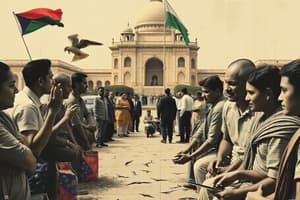Podcast
Questions and Answers
What is the main consequence of marginalization as described in the text?
What is the main consequence of marginalization as described in the text?
- Empathy, awareness, and collective action
- Equal access to resources and opportunities
- Enhanced decision-making processes
- Systemic disadvantages and exclusion (correct)
Which of the following is NOT a factor contributing to marginalization?
Which of the following is NOT a factor contributing to marginalization?
- Disability
- Religion
- Political representation (correct)
- Economic status
What is a crucial role that governments play in addressing marginalization?
What is a crucial role that governments play in addressing marginalization?
- Encouraging discrimination based on historical factors
- Excluding marginalized groups from decision-making processes
- Implementing policies that support equitable development (correct)
- Creating more divisions among communities
How does society overcome marginalization according to the text?
How does society overcome marginalization according to the text?
Which document is mentioned as a key element in the context of combating inequality in the text?
Which document is mentioned as a key element in the context of combating inequality in the text?
What is an essential component for fostering social justice according to the text?
What is an essential component for fostering social justice according to the text?
Which provision of the Indian Constitution prohibits discrimination based on race, caste, sex, and place of birth?
Which provision of the Indian Constitution prohibits discrimination based on race, caste, sex, and place of birth?
What is the purpose of affirmative actions like reservations and quotas in the Indian context?
What is the purpose of affirmative actions like reservations and quotas in the Indian context?
Which legislative measure in India aims to eliminate child labor and provide education to all children?
Which legislative measure in India aims to eliminate child labor and provide education to all children?
What key aspect of Indian democracy guarantees citizens the right to challenge the constitutionality of laws?
What key aspect of Indian democracy guarantees citizens the right to challenge the constitutionality of laws?
Which provision in the Indian Constitution promotes fraternity and unity among citizens without regard to certain grounds?
Which provision in the Indian Constitution promotes fraternity and unity among citizens without regard to certain grounds?
What is the primary objective of legislation like the Right to Education Act in India?
What is the primary objective of legislation like the Right to Education Act in India?
Flashcards are hidden until you start studying
Study Notes
Unraveling Civics: Marginalization, Constitution, Laws, and Social Justice
In our quest to understand civics, we'll dive into the complexities of confronting marginalization within democratic societies like India—a nation known for its diverse culture and turbulent journey towards inclusion and equality. We'll analyze specific facets related to marginalized communities, the Indian Constitution, laws designed to combat inequality, and their impact on fostering social justice.
Understanding Marginalization
Marginalization occurs when certain groups face systemic disadvantages and exclusion due to factors such as caste, religion, gender, ethnicity, disability, economic status, age, or sexual orientation. In essence, they lack access to resources, opportunities, and decision-making processes that shape the society around them. Examples include unequal education outcomes, unemployment, lower wages, inadequate healthcare facilities, limited political representation, and poor living conditions among these vulnerable populations.
Confronting Marginalization
Overcoming marginalization requires empathy, awareness, and collective action from all members of society. Governments play a vital role in implementing policies, programs, and legal frameworks that support equitable development and address historical and ongoing discrimination. Some strategies employed by governments globally include affirmative actions (reservations), quotas, reparations, public campaigns against prejudice, community outreach, and capacity building initiatives aimed at empowering marginalized communities.
Indian Context & Constitution
The Indian Constitution was adopted with a vision of creating an inclusive society where every citizen enjoys equal protection under the law, irrespective of their background. This document embodies fundamental rights, directive principles of state policy, parliamentary democracy, federalism, judicial review, and independence of constitutional bodies. Notably, provisions like Articles 14, 15, 17, and 38 guarantee citizens equality before the law, prohibit discrimination based on race, caste, sex, place of birth, and more, and promote fraternity and unity amongst Indians without regard to any grounds mentioned above.
Legal Enactments and Social Justice
Numerous legislative measures have been enacted in India over time to safeguard and uphold social justice. The Reserved Seats Act, for example, mandates reservation of seats in local government bodies, houses of Parliament, and State Legislatures for scheduled castes and tribes, while also providing special representation to women, backward classes, and persons with disabilities. Similarly, legislation such as the Child Labor Prohibition Act, Right to Education Act, National Commission for Scheduled Castes and Tribes Act, Protection of Civil Rights Act, and Scheduled Castes and Scheduled Tribes Prevention of Atrocities Act aim to eliminate oppression faced by historically marginalized sections of society.
As responsible global citizens, understanding civics through this lens allows us to recognize diverse realities, strive toward equality, and engage constructively with crucial issues surrounding marginalized people worldwide. By reflecting upon past mistakes, learning from current challenges, and working together thoughtfully, we can build a world that embraces each individual's unique identity and empowers everyone to thrive individually and collectively.
Studying That Suits You
Use AI to generate personalized quizzes and flashcards to suit your learning preferences.



